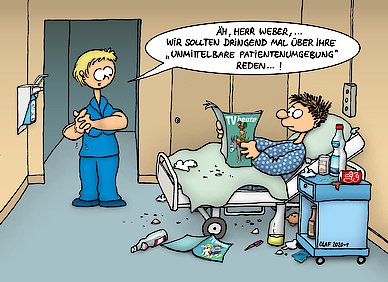Self-Protection
Colonization or infection with so-called “hospital germs” is a complex process and is dependant on many factors. Infections often arise from pathogens commonly found, despite all hygienic measures, in the patient’s own body. Only a certain percentage of infections in patients are transmitted because of inadequate hygienic measures. Such reasons are procedures that disable the body’s barrier function (for example, surgery, catheters). In addition, there are also factors related to the patient him or herself that can influence their body’s defense mechanisms.
However, even if not every infection can be prevented, the following ideas should be kept in mind. Recommendations of the doctor treating you also help reduce the risk of an infection (for example, regarding smoking before and after operations). If you are in the hospital and are unsure if a staff member has disinfected their hands, before you are examined or treated, ask them about it in a friendly manner. If a staff member has put examination gloves on, ask them also if their hands were disinfected. Because only hand disinfection will protect you.
To protect other patients and staff from infections and transmissions, observe the recommendations of the healthcare institution.
In the event of respiratory tract infections, observe good sneezing and coughing etiquette and let medical staff know early on that you may be suffering from an infectious illness.
In addition, you should wash your hands thoroughly with soap and water or disinfect them after every trip to the bathroom.
When hospital staff are performing some activity on you (washing, bandages, taking blood, setting or manipulating catheter, infusions, etc.) they must disinfect their hands immediately beforehand. If this is not the case, you should attempt to speak to the staff member about it. Doctors have to perform hand disinfection in the same situations as other healthcare workers and you should speak to them just as you would other healthcare staff. There is no difference!
We know from research that it is difficult for patients and their families to make staff aware of presumed negligence. The barrier is even higher when it comes to doctors. Such an exchange should be possible in a climate of mutual trust, regardless of professional status.
The campaign Hand in Hand was developed to build a relationship of trust between staff and patients and their families. Annually, on the occasion of World Hand Hygiene Day on May 5, Aktion Saubere Hände also prepares support materials for healthcare workers to involve patients and their families.
Aktion Saubere Hände’s campaign in Germany and Austria has reached many institutions since 2008 and the medical centers have responded with a great deal of enthusiasm. There are not any other international campaigns with a similarly large number of participants. In particular, because participation is voluntary. That is unique.
It is significantly more difficult to make such a breakthrough in outpatient care. The challenge is that these institutions have different structures than hospitals. Another factor is that in these areas of healthcare there is a much smaller number of scientific studies on the frequency of treatment-associated infection or transmission. It is also relatively difficult to quantify risks and thus to create an awareness of risk. Here we depend on cooperation with professional associations to increase awareness of the relevance of preventative measures.


